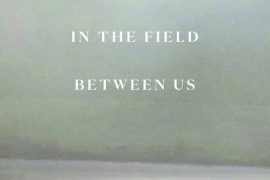It’s possible one could go their entire lives and experience a single death, only their own. The aftermath of unpredictable tragedy, there would be nothing to observe, nothing to predicate one’s visions and versions of death. There would be, instead, everything to experience. This happens to almost no one—yet in his third collection, Dad Jokes from Late in the Patriarchy, Amorak Huey imagines what possibilities death can take, imagines how our lives are organized before that experience. Huey, an American poet, notices a bumper sticker while driving—who’s paying attention to the road?—then, with a thruway thought-experiment involving “rejected bumper stickers,” remembers everyone he loves must die. Every life he envisions, including his own, will eventually become unimaginable: “What if you die,” he asks, then the question revised, “What if I die?”
What if? What Huey articulates as speculation, as a mind improvising a narrative with infinite endings, is also a metaphorical redesign, an attempt to make intelligible a series of definite, painful truths. A parent injects their joke with lessons more difficult to state to children otherwise, candidly or bluntly:
At some point I came to understand
my job was to make the world
more bearable for my children.
It’s possible I was wrong & anyway
I don’t think I’m very good at it.
This qualification from “Dad Jokes,” with its hokey plays on semantic meaning, is also a confession, a way of directing us beyond the jokes themselves towards the reason for telling one in the first place. There are simple questions one asks after learning that this collection’s methodology is, like humor itself, a subversion of what one expects from the ostensible “punchline,” the imperative, any given instructions on living: what seems funny about our lives right now? Rather, what degree of absurdity does a punchline need to achieve for something to even strike us as unpredictable in the year 2021? From the same poem, Huey answers these questions: “No one’s laughing. I’m not laughing.”
No one here is laughing, Huey and his readers alike, and not laughing is offered as a comfort—as if, halfway through the joke, the comedian learns the immediate circumstances which make the punchline inappropriate, or not worth its own telling. The poems adapt to their own making, then, as if to affect this process and response in real time: the poem as something experienced rather than static and encoded. With a poem titled after the infamous and mocked clarion call of improv troupes, “Yes, And,” Huey directs our staging of this poem in real-time: “If I say everything is a gun / you have to say yes, and / the gun is always going off.” Here, Huey’s readers perform alongside the poet in his improv-troupe; we are directly implicated in how the show is performed and whether or not the audience laughs. Who wants to be volunteered to jump on stage?—and predicting this stage-fright, Huey’s relationship to his performing troupe is contentious: “I say, but—and you interrupt: / no arguing. Someone really / could get hurt.” Someone could get hurt because the figurative gun is placed on a page, in a poem, in which figurative objects supercharge language with wide-ranging and altogether specific meaning. Expansive, because this improv-troupe includes everyone who reads these poems; specific because there is an identifiable place where “everything is a gun,” somewhere outside of this imagined blackbox theater: “You say yes, and let’s start again: / It’s America. Everything is a gun.”
My slight phrasing suggested these poems adapt to their own imagined and initial circumstances—but to borrow Huey’s own term, these poems “autocorrect.” In “Poems Autocorrects to Porns,” the simple and often profound process of one thing coming to stand for another is enlarged, the poet observing the process of many parts accumulating into a figurative whole:
which doesn’t make sense because isn’t porn like soup
or fog? But maybe so are poems, maybe
we’re all tangled in the effort to give language
to our body’s cravings: the human condition,
in other words.
Whether or not the automatic change from poem to porn “makes sense,” a transposition is observed and made. Whether or not porn is like soup or like fog, the deliberate curtailing of something which would “make sense’ is also to enact a process of thinking about that correction. Later in the collection, “Amorak Autocorrects to Amoral,” and this striking and reflexive change manifests—no set-up and no punchline—a reflection on moralizing idioms as shaping one’s understanding of how their own sexuality was formed between childhood and adulthood. The poem begins midway through a spoken thought, a reaction to the autocorrect: “which surely comes as no surprise to anyone / in the town where I grew up. / I hated that place.” What follows in tercets is a meditation on “the possibilities / of tongue & the small miracle / of holding hands in the dark.” As much as this collection deals itself in posterity and joke-telling—what imperatives one offers to everyone who cares for the future—it equally wrestles with the trouble of inheritance, traditions that have unconsciously shaped how one views their various social roles: father, comedian, actor, poet.
The phrase Late in the Patriarchy suggests an impending turn, a dismantling, a moment in which his dad jokes will soon become more outdated than they appear in the present. Late in the Patriarchy, for Huey, is also an imperative to look at what moralizing figures existed at some indeterminate moment earlier in the era. A series of prose poems addresses the model of television fathers, ranging from Fred Flintstone to Bob Saget. “We Were All Odysseus in Those Days” recalls the artful brutality associated with Homer’s epic. In the first of three poems titled “Fairy Tale,” inevitably a sequence which reconfigures the tropes of a children’s story, Huey considers a male protagonist who briefly evades feeling, and who arrives at the end “not knowing how to feel”:
I cannot wear my father’s body—
we are a poor fit—
as my son will not
wear mine, now
or ever. To feel myself pinned
between the two boulders
of my body & my duty.
Here: the anxiety of assuming responsibility as someone who inherits “duty” as well as someone who distributes ideas of duty. Throughout Dad Jokes, there’s nothing close to a prescriptive answer in dealing with that anxiety—rather a sustained vulnerability through which these poems enact their own reconciliation with “the two boulders,” my body and my duty.
Either way, a story is told: the narrative of a joke may surprise us into laughter, and more specifically, a dad joke contends with denotative meaning literalized out of context. A poem arranged as something to be experienced on the page, as a performance either in our minds or spoken and heard, depends on someone to experience that poem. Because of this, Huey’s newest collection is privately sincere without obfuscation; these are generous poems which invite participation. In a poem characteristically titled “When the Topic Turns to Crazy Things We’ve Done for Work,” Huey remembers what’s implied when we re-tell the same stories, as if they’ve become our personal lore: “That’s not the point / of the story. There isn’t one, / I guess, it’s just a thing that happened.” Of course, though, there is a point to the story—just as there are always points to jokes, poems, workplace rumors, junk mail—and the point of Huey’s stories is the process, and the experience, of their own telling.





